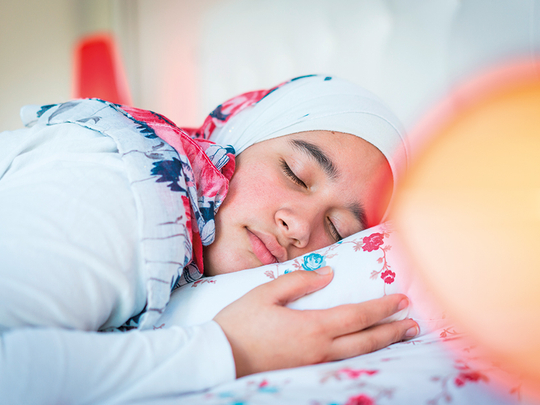
Dubai: Keeping a healthy sleep cycle during Ramadan is essential as most worshippers stay up late and wake up early, doctors have said.
As the demands of the discipline of the month of Ramadan require Muslims to make significant changes to their usual routine — from altering their food intake, increasing their prayer time, to waking up before 4am to catch up for Suhoor — many end up falling short of sleep.
Given the importance of sleep for a healthy body and mind, with a little care and discipline those fasting can effectively manage the altered sleep pattern to minimise its adverse impact.
“Some people try to do too much during Ramadan. They spend their days at work or taking care of their children and nights engaged in social activities or at the mosque. Amid all of this, some people do not sleep enough,” says Dr Irshaad Ebrahim, Sleep Physician at the London Sleep Centre Dubai.
Sleep deprivation not only affects the way you feel the next day, but it also has long term health consequences that drains your mental abilities and challenges your physical health, according to Dr Vishal Pawar, specialist neurologist at Aster Speciality Clinic.
“Lack of adequate sleep causes memory disturbances and attention disorders, it worsens anxiety and depression. Lack of sleep also impairs learning of new tasks and causes memory disturbances,” he said.
Irrespective of our schedule, experts say that the adult brain requires between seven to nine hours of sleep in every 24 hour sleep-wake cycle.
“It is important to understand that it is not necessary to get all your sleep requirement in one go. You can divide your sleep period into two episodes of sleep during Ramadhan as long as the total amount of sleep adds up to the seven to nine hours that you require,” said Dr Ebrahim.
A simple measure of whether one is getting enough sleep is by sensing how you feel when awake, he added. “If you feel alert and functioning optimally then you are getting enough sleep. However, if you feel tired, lethargic and sleepy then you need more sleep.”
Among the most common mistakes people make during Ramadan is eating heavy meals and going to bed right after, drinking lots of coffee and taking long daytime naps.
“During Ramadan people tend to stay up all night, try to sleep late after Fajr prayers, then they have to go to work. Alternatively, some people will stay up all night, have a heavy meal at Suhoor then go to sleep for six to eight hours. This is not a healthy solution,” said Dr Ebrahim.
Early to bed and early to rise
What he recommended is that people get some sleep from after Taraweeh to Suhoor time, even if it is only three to four hours.
“The night-time period is the optimal period to sleep as this is when Melatonin secretion is at its highest and most beneficial. Then to catch up your requirement — Sleep between Asr and Maghrib Salaat for three to four hours. Using this scheduling you are guaranteed adequate and healthy sleep,” Dr Ebrahim explained.
While napping does not make up for inadequate sleep at night, a short nap of 20 to 30 minutes can help improve mood, alertness and performance, Dr Pawar pointed out.
Steering clear of food that can be disruptive right before sleep is also crucial. Heavy or rich foods, fatty or fried meals, spicy dishes, and carbonated drinks can trigger indigestion for some people.
“When this occurs close to bedtime, it can lead to painful heartburn that disrupts sleep,” said Dr Pawar, noting that maintaining adequate hydration with plenty of liquids orally is equally important.
Moreover, as little as 10 minutes of aerobic exercise, such as walking or cycling, can drastically improve night-time sleep quality. For a good night’s sleep, most people should avoid strenuous workouts close to bedtime. However, the effect of intense night-time exercise on sleep differs from person to person, so find out what works best for you, said Dr Pawar.
Some tips
Dr. Hady Jerdak, Internal Medicine, Pulmonary Diseases, Sleep Disorders, Critical Care at Medcare Hospital has a few pointers to sleep better:
Make a plan before Ramadan which fits in with your schedule, follow some that you can stick to as best as possible.
Schedule times of worship.
Find a quiet place away from the work station, such as your car, and take a 20-minute nap when needed.
Ensure your sleep environment is quiet and dark to get quality sleep without distracting factors. Earplugs and eye masks work wonders for getting into and staying in deep sleep.
Do not consume heavy, calorie-loaded and sugar-rich foods at iftar, it can affect the quality of your sleep.
Avoid very spicy foods and fried foods.
Avoid coffee and caffeine-containing products, as there are stimulants and can interfere with sleep. Avoid processed and salty foods, which are high in sodium as they will cause dehydration.








